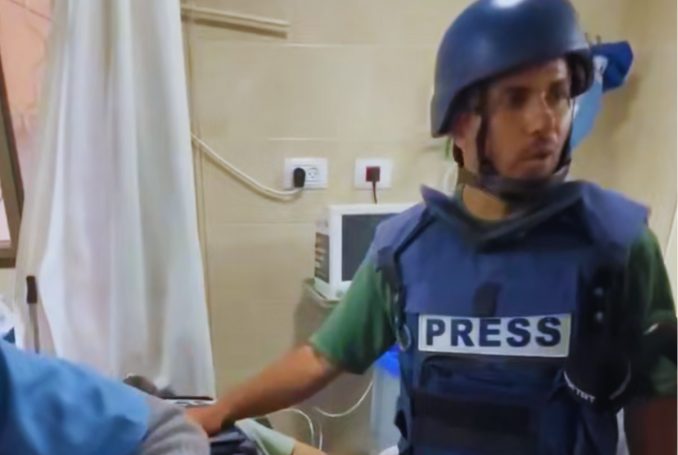
By Jeremy Salt
“It is their job to bring us what Israel does not want us to see.”
Imagine, or try to imagine, going to work every day when your work is witnessing death close up.
Not the quiet undertaker’s death but the gory death of the massacred. Dead bodies, wounded bodies, and bodies of blood-soaked children being carried into hospitals while their relatives scream in anguish and throw their arms towards the heavens looking for supplication. Often only the parts of bodies are there to be found.
In Jabaliya this week the bodies were decomposing in the streets behind the reporter’s back as he spoke as calmly as he could to the camera.
Witnessing this hell and reporting it is your work, day after day and month after month. At the same time you have to do your best to avoid being killed, but to report truly, being killed is what you have to risk. While you are in the streets your family is home. Your constant fear is not that they are not safe because you know they’re not. No one is safe. Your fear is that the next missile strike will kill them, too.
You can probably get out of Gaza but you won’t do that because someone has to bear witness and this is your role. Everyone who survives bears witness but you and you alone have the special responsibility to tell the world what is happening, which is why you become a special target to the enemy, a dangerous voice that needs to be silenced.
Since October 7, 2023, more than 130 of these voices in Gaza, among nearly 180 media professionals, have been silenced – silenced permanently. Nearly all are Palestinian.
Western journalists run no risk of being killed in Gaza because they are not there. The government of Israel won’t allow them in so they can’t report this ‘war’ (daily massacre of civilians) and apparently they cannot get in from the Egyptian side either.
Informing the world thus falls almost exclusively on the shoulders of Palestinian journalists working for Al Jazeera and smaller news outlets, some affiliated with Fatah or Hamas, including Watan, Ajmal Radio, Palestine TV, WAFA, Al Shehab and Al Aqsa news network. RSF (Reporters Without Borders) estimates that at least 32 journalists have been targeted and ‘killed’ (murdered) by Israel since October 7 2023.
The list includes:
Rushdi al Sarraj, co-founder of Ain Media, and a freelance journalist, killed in a missile attack on October 23, 2023;
Samer Abudaqa, of Al Jazeera Arabic, killed in December, with his colleague Wael al Dahdouh, the head of Al Jazeera’s Gaza bureau, wounded;
Hamzah al-Dahdouh, the son of Wael, killed in a missile strike in January 2024 ( an “apparent” air strike the Associated Press (AP) reported, as if anyone can be killed in an “apparent” air strike). Wael’s wife, daughter, 7, son, 15, and eight other relatives had already been killed in an air strike on October 28, 2023;
Abdallah Aljamal, who was a contributor to Palestine Chronicle among many other news outlets, killed in June during an undercover raid on the Nuseirat refugee camp. Abdallah’s wife, Fatima, was killed in the stairwell, indicating that the Israelis did not even know who she was when they shot her. Breaking into the family apartment, they shot dead Abdallah and his father, a medical doctor, aged 74, and wounded his sister Zainab.
Scores of people in surrounding streets were killed in covering fire, which eventually included air strikes. The occupation forces later destroyed the entire building. Israeli claims that three hostages were being held in the family apartment were challenged by other sources, who said they were being held elsewhere in the building.
Ismail al-Ghoul, an Al Jazeera Arabic reporter and cameraman Rami al Rifai, both killed in July in an air strike, along with a child “not identified”, as AP reported.
These are only a few names out of the 130, to which have to be added the names of Palestinian journalists killed over the years in Gaza and the West Bank, only some (notably Shireen Abu Akleh, murdered by a sniper on the West Bank in 2022) ever being reported or being reported in any detail in the western news cycle. All the journalists wear helmets and press jackets so can be closely identified.
Journalists are targeted in Lebanon as well. On October 13, 2023, a group of seven journalists were targeted near the Lebanon-Israel armistice line (the ‘border’) but a mile away from any hostilities. Two tank shells were fired, killing Reuters correspondent Issam Abdullah and seriously wounding Lebanese AFP correspondent Christine Assi (her leg was later amputated). The tank shells were followed by machine-gun fire. The Israelis knew they were there and were out to kill.
The journalists in Gaza are frequently displaced along with everyone else. Their press offices are destroyed, their families are threatened or killed, some are arrested and disappear with others into Israel’s prisons.
All this is done with complete impunity, along with all the other crimes Israel commits. In January RSF filed four complaints with the ICC, accusing Israel of committing war crimes against journalists. Although it was assured something would be done, nothing has been done, which cannot be surprising seeing that the ICC has yet to follow through on the war crimes indictments requested by chief prosecutor Karim Khan against Netanyahu and Gallant. Neither has the ICJ moved any further from its January finding that Israel was committing “plausible” genocide in Gaza.
Shoot the messenger is literally what Israel is doing to stop the flow of news from Gaza.
Within its own boundaries (as a UN member Israel is unique as a state that has never declared its borders), all news going out is sanitized first by the military censor. The only reliable news about what is happening in Gaza is coming out of Gaza, hence the murderous campaign launched against its journalists.
They have the same problems as everyone else. Not enough food, water or electricity and grief over family or friends killed or wounded but they continue to do their job despite the daily risk to their own lives.
As the main news link to the outside world, Al Jazeera’s reporters are the most familiar. They are heroes in their own way.
Hani Mahmoud, Hind al Khoudary, Tareq Abu Azzoum, Moath al Kahlout, and several others, have been reporting on this war every day for more than a year.
They are seeing things no one would want to see, that stay in the mind once inside and never leave, the torn bodies of people they know and don’t know, the stuff of lifetime nightmares.
Staying calm, almost always, they report day after day from streets strewn with bodies and body parts, or from outside hospitals as the wounded or dead bodies of children are carried in. They have had to look into the mass graves and see the corpses of the innocent lined up in their shrouds.
We the viewers and readers don’t want to witness these horrific sights any more than they do but to know what is going on, we must see them even if we flinch and look away because the sight is unbearable.
It is their job to bring us what Israel does not want us to see. That these reporters still have the strength to do this after a year without breaking down (although there must be times when they come close) is extraordinary.
(The Palestine Chronicle)

– Jeremy Salt taught at the University of Melbourne, at Bosporus University in Istanbul and Bilkent University in Ankara for many years, specializing in the modern history of the Middle East. Among his recent publications is his 2008 book, The Unmaking of the Middle East. A History of Western Disorder in Arab Lands (University of California Press) and The Last Ottoman Wars. The Human Cost 1877-1923 (University of Utah Press, 2019). He contributed this article to The Palestine Chronicle.